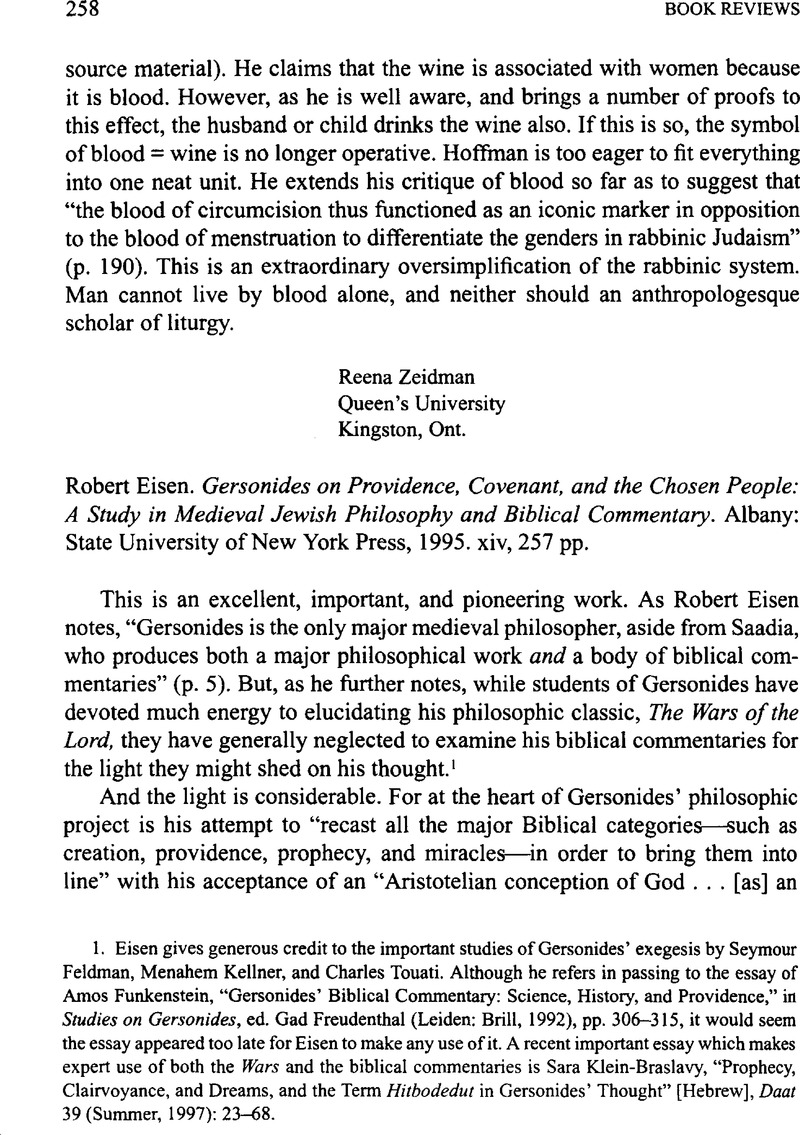No CrossRef data available.
Article contents
Robert Eisen. Gersonides on Providence, Covenant, and the Chosen People: A Study in Medieval Jewish Philosophy and Biblical Commentary.Albany: State University of New York Press, 1995. xiv, 257 pp.
Published online by Cambridge University Press: 15 October 2009
Abstract

- Type
- Book Reviews
- Information
- Copyright
- Copyright © Association for Jewish Studies 1998
References
1. Eisen gives generous credit to the important studies of Gersonides' exegesis by Seymour Feldman, Menahem Kellner, and Charles Touati. Although he refers in passing to the essay of Funkenst, Amos “Gersonides' Biblical Commentary: Science, History, and Providence,” Studies on Gersoni ed. Freudenthal, Gad (Leiden: Brill, 1992), pp. 306–315,Google Scholar it would seem the essay appeared too late for Eisen to make any use of it. A recent important essay which makes expert use of both the Wars and the biblical commentaries is Sara, Klein-Braslavy, “Prophecy, Clairvoyance, and Dreams, and the Term Hitbodedut in Gersonides' Thought” [Hebrew], Daat 39 (Summer, 1997): 23–68.Google Scholar
2. One minor correction. Eisen's translation (p. 90) of Gersonides' comment on Deut. 29:28 as “God did not command us to obey the words of the Torah just with regard to that which is overt in them” is misleading. The correct translation is “God commanded us to obey the words of the Torah only with regard to that which is overt in them” (lo...raq = lo 'ela).
3. A comparison of Eisen's reading of Gersonides' views on the messianic era and esotericism with the very different reading of Dov Schwartz would prove enlightening, but must be left for another occasion. See Schwartz, Dovessianism in MedievalJewish Thou[Hebrew] (Ramat-Gan:Bar-Ilan University, 1997), pp. 184–186.Google Scholar
4. One should also mention that Gersonides requires a much lower threshold for achieving perfection of the soul than does Maimonides. See Harvey, Warren Z., “Crescas' Critique of the Theory of the Acquired Intellect” (Ph.D. diss., Columbia University, 1975).Google Scholar
5. Eisen, however, at times conflates Gersonides' views on the suffering resulting from inherited providence with his views on “sufferings of love” resulting from one's own providence.
6. Interestingly enough, since for Gersonides there will be no need for inherited providence in the messianic era, and it will consequently cease to function, in this respect the messianic era will be less miraculous than present times.
7. Amos Funkenstein, “Gersonides' Biblical Commentary,” p. 314.
8. See Kaplan, Lawrence, “Maimonides on the Singularity of the Jewish People,” Daat 15 (Summer 1985): v-xxvii;Google ScholarKellner, MenahemMaimonides on Judaism and the Jewish Peo(Albany: State University ofNew York Press, 1991), pp. 81–95;Google Scholar and Lewinger, JacobMaimonides as Philosopher and Codif (Jerusalem: Mossad Bialik, 1989), p. 89.Google Scholar
9. Funkenstein, “Gersonides' Biblical Commentary,” pp. 305 and 315.


